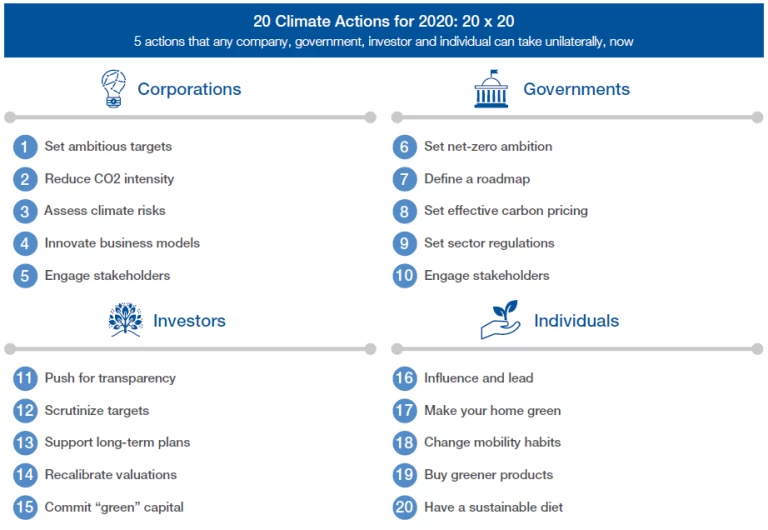GENEVA—The World Economic Forum (WEF), in collaboration with Boston Consulting Group (BCG), released a report today that examines the current state of climate action by companies and governments and provides insights about the actions that corporations, governments, and civil society can take now, both collectively and individually, to limit global warming. The report, which will be presented at the WEF annual meeting in Davos-Klosters, is titled, The Net Zero Challenge, in recognition of the need to move to net-zero emissions globally by 2050.
The year 2020 marks the fifth anniversary of the Paris Agreement, which committed world leaders to limiting global warming to well below 2°C. However, greenhouse gas emissions have continued to rise at a rate of 1.5% per annum over the past decade. A reduction of >5% per annum is now needed through 2030 to limit the worst impacts of global warming and net-zero carbon emissions must be reached by 2050.
Business and Investors Should Accelerate Action—in Their Own Interest
All 20-plus CEOs and 14 climate experts who were interviewed for the report highlighted the need to accelerate climate action—both as a moral imperative and as a business opportunity. The analysis, based on the responses of nearly 7,000 companies to the CDP climate questionnaire, shows that not enough is being done by companies today, with only a small minority disclosing their emissions and even fewer setting any kind of emission reduction target.
The Net Zero Challenge examines the ways in which climate action can be seen as a source of competitive advantage for companies—as a means of reducing costs by increasing efficiency, fulfilling the needs of increasingly climate-conscious customers, and attracting the best possible talent. It emphasizes that businesses should be accelerating efforts to reduce the carbon intensity of their operations and that of their supply chains, to manage their climate-related investment risks, and to innovate to refocus their business models for growth in a decarbonized world.
The report shows how investors, too, need to play a pivotal role in triggering and facilitating climate action, as they have an inherent interest to “de-risk” the terminal value of their investments by pushing for more transparency and disclosure and by supporting longer-term corporate decarbonization plans.
Where financial or structural barriers prevent businesses from moving forward, ecosystem initiatives can enable collaboration among industry peers or along value chains to provide risk-sharing mechanisms and help accelerate the speed and scale of change.
“A Paris-compatible pathway implies a significant, sometimes existential, transformation for many companies. Innovation is needed, and many businesses can look for growth in new markets for lower-carbon products and services,” said Cornelius Pieper, a BCG partner and coleader of the firm’s Center for Climate Action.
A Call for Unilateral Government Action and Individual Leadership
Progress among policymakers has been limited to date. While 121 countries now have an ambition to be carbon-neutral by 2050, they together account for less than 25% of global emissions. None is among the top five emitters, and very few have enacted policies that are robust enough to produce the desired effects.
The report calls for accelerated unilateral policy action from governments to set the context needed for companies to decarbonize, such as by implementing carbon pricing and other sector-specific regulations and incentives.
“The good news is that governments can act unilaterally to reduce emissions, as many countries can benefit economically from carbon abatement investments. What is needed is an ambitious policy context that includes a meaningful carbon price, supported by incentives and other measures,” said Patrick Herhold, a BCG partner and coleader of the Center for Climate Action.
The report also stresses that educated voters and consumers are a crucial enabler of the low-carbon transition - better information is needed across all channels about what it will take to achieve net-zero emissions, and communications need to focus on solutions and the benefits of change.
We each have a responsibility to deliver a safer world as leaders in business and in policy, and as parents.
“Climate action is still too often perceived as a cost or a tradeoff with other priorities,” said Michel Fredeau, a BCG senior partner and leader of the firm’s work in climate and the environment. “It should be viewed as an opportunity for businesses, countries, and individuals to create an advantage in building a better, more sustainable world.”
The Net Zero Challenge concludes with actions that companies, governments, investors, and individuals can take to start reducing emissions in 2020:

A copy of the report can be downloaded here .
To arrange an interview with one of the authors, please contact Eric Gregoire at +1 617 850 3783 or gregoire.eric@bcg.com .